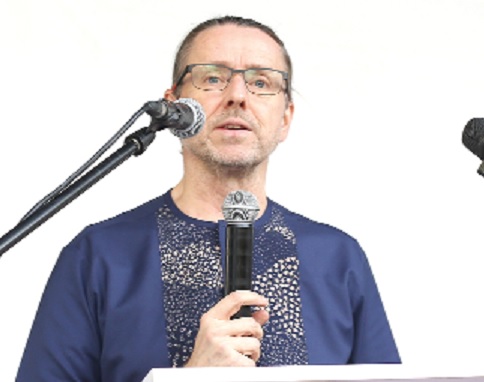The German Agency for International Cooperation (GIZ) has marked the 50th anniversary of the signing of the Ghana–Germany Technical and Economic Cooperation Agreement with an Arts and Photo Exhibition at the Goethe-Institut in Accra.
The event, held last Friday, was on the theme: “Visions of Impact: Rethinking Development through Art, Innovation and Local Realities,” celebrated half a century of partnership between the two countries.
It showcased visual arts, paintings, photography and animation by five finalists whose works explored social, economic and environmental themes such as climate change, education, renewable energy and inclusive growth.
Among the featured artists were Mercy Dartey (Ashes to Art), Juliet Appiah (Trash to Treasure), Kojo Ahadzie (Skilled with Purpose), Nana Frimpong Oduro (Butterfly Effect), and Najilau Atta Dramundu Abdul Karim (Adibo).
The exhibition also included a Princess Town Heritage Project display, highlighting Ghana–Germany historical ties, and a photo gallery on development cooperation impact stories.
Princess Town (Pokesu) is located 5 km east of Fort Saint Antonio on Manfro Hill in the Ahanta West District in the Western Region.
The programme brought together artists, policymakers and development experts for a panel discussion on how culture and innovation could contribute to sustainable national growth.
Shared values
The Country Director of GIZ Ghana, Dr Dirk Aßmann (Ass-mahn), described the 50th anniversary as a celebration of shared values, partnership and progress.
![]()
He traced the cooperation’s origins to the 1975 technical agreement and early agricultural projects in northern Ghana, which improved crop productivity and livelihoods.
Over time, he said, the partnership had expanded to governance, peace, technical education, renewable energy and private sector development.
Dr Aßmann emphasised that while development was often technical, art remained a powerful tool for storytelling, innovation and reflection—helping societies question, connect and drive transformative change.
Art for development
Panellists at the forum, which also featured as part of the event, unanimously called for stronger recognition of the arts and creative industries as powerful tools for social transformation and economic development.
It featured a multidisciplinary artist and researcher, Dr Sela Kodjo Adjei; an artist and teacher, Fatric Bewong; the Assemblyman for Princess Town, Lord Owusu Mensah, and the Head of Development Cooperation at the German Embassy, Johanna Klotz.
They argued that the sector, employing thousands across Ghana, held potential to create decent jobs, promote cultural identity, and advance the Sustainable Development Goals (SDGs).
The speakers further urged the government to provide tax incentives and funding support for artists and cultural producers, noting that access to affordable event spaces and production materials would help boost the creative enterprise.
They also underscored the need to make art a channel for civic engagement, policy communication, and heritage preservation.
The discussion highlighted how cultural cooperation, innovation, and storytelling could connect communities, foster inclusiveness and sustain Ghana–Germany relations.
Participants agreed that investing in the creative economy was not merely a cultural gesture but a strategic move towards building resilient, self-reliant societies that value both development and identity.

